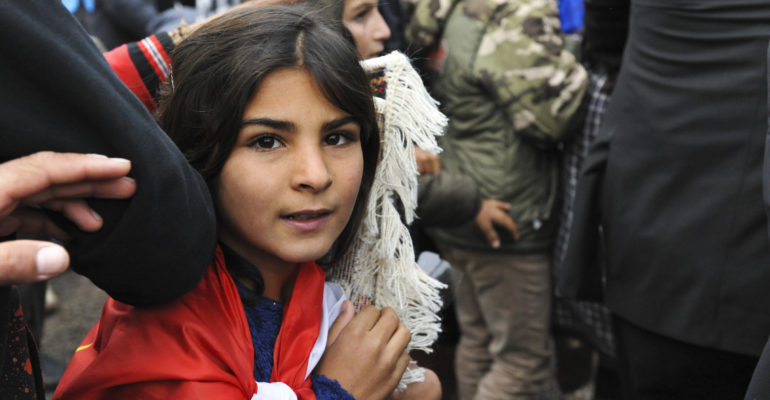A blog by Linda Witong, SI Special Advisor to Advocacy
“On July 13, we were able to participate in a historic moment. On that date, more than 190 countries agreed on a Global Compact to Promote Safe and Orderly Migration culminating lengthy and often contentious negotiations after more than a year of meetings among Member States, local officials, civil society and migrants themselves. In a statement, Secretary-General António Guterres welcomed the agreement, calling it “a significant achievement” as it reflected “the shared understanding by Governments that cross-border migration is, by its very nature, an international phenomenon and that effective management of this global reality requires international cooperation to enhance its positive impact for all. It also recognizes that every individual has the right to safety, dignity and protection.”
General Assembly President Miroslav Lajčák, while agreeing that we were witnessing a historical moment, then explained what limitations existed within the Global Compact’s as well as what potential it represented for the world. For example, the Global Compact would: “not encourage migration, nor does it aim to stop it. It is not legally binding. It does not dictate. It will not impose. And it fully respects the sovereignty of States.” However, General Assembly President Miroslav Lajčák then explained how the Global Compact could be of benefit to the world: “It can guide us from a reactive to a proactive mode. It can help us to draw out the benefits of migration, and mitigate the risks. It can provide a new platform for cooperation. And it can be a resource, in finding the right balance between the rights of people and the sovereignty of States.” Mr. Lajčák then observed that, when the agreement will be formally adopted by Member States in Marrakesh, Morocco, in December 2018 during the Intergovernmental Conference, “it will formally become the first comprehensive framework on migration the world has ever seen.”
Deputy Secretary-General Amina J. Mohammed also observed that the Global Compact served as a illustration of “the potential of multilateralism: our ability to come together on issues that demand global collaboration – however complicated and contentious they may be.”
The United States was not present during this proceeding as the United States had ended its participation in negotiations on the compact. A statement from the U.S. Mission to the United Nations said numerous provisions of the declaration were “inconsistent with U.S. immigration and refugee policies” under President Donald Trump.
On July 13, 2013, Minister of Foreign Affairs and Trade Péter Szijjártó of the Hungarian government also spoke at length during this event expressing his concerns as to how this would affect his country and its citizens. During a press conference on July 13, 2018, Péter Szijjártó expressed these concerns again. For example, Péter Szijjártó expressed his belief that the package “does not deal at all with the existing fundamental human rights of people who want to live in secure and peaceful conditions in their own homelands”. According to the text, humans are the focus of attention, but this is not the case, because the package “only takes into account the interest of migrants”, he stated.
The Foreign Minister, Péter Szijjártó, also spoke about the fact that the package prescribes obligations for member states that can be interpreted by migrants as an invitation, and the implementation of which will give rise to another wave of millions of immigrants. “The Compact wants to make it mandatory for countries to provide all services to migrants along the whole length of their migration route, and that these services must be the same as those that they provide to their own citizens”, he explained. “In addition, the migrants must be continuously provided with information, as well as with the opportunity to communicate with their relatives at home”, he added.“The package also wants to makes it mandatory for countries to provide training to migrants both before and after their arrival, to expand opportunities to lodge complaints with the involvement of NGOs, to provide discounts on the cost of their bank transfers home, to transfer illegal immigrants to a legal status instead of sending them home, and to continuously increase receiving capacities”, he said. “Furthermore, border protection will have to be handled as a human rights issue, not a security issue”, he added. In the Minister’s opinion, these measures will endanger the countries that apply them and will give rise to further waves of mass migration. During his press conference, the Foreign Minister also stressed that, in contrast to previous claims, the Global Compact for Migration will become part of the international legal system and will serve as a point of reference with relation to the application of both national and international law; this is why it states that all countries must develop their own national program for the application and implementation of the measures included in the package.
“This is the same process that they succeeded in achieving in the European Union with relation to the quotas; first they made it appear as if the quotas would be voluntary, but in the end they became mandatory”, he noted.
The Minister said that in view of the fact that the Compact states that national programs must be drawn up for its implementation, at Wednesday’s Cabinet meeting he will be proposing that Hungary exits the adoption process relating to the Global Compact for Migration and makes it absolutely clear that it in no way regards any of the measures or guidelines included in the migration package as applicable to itself”.
Lead Image courtesy of UN Media: UN Photo/Fabienne Vinet
Further information at UN News

